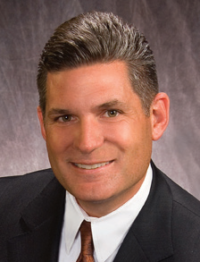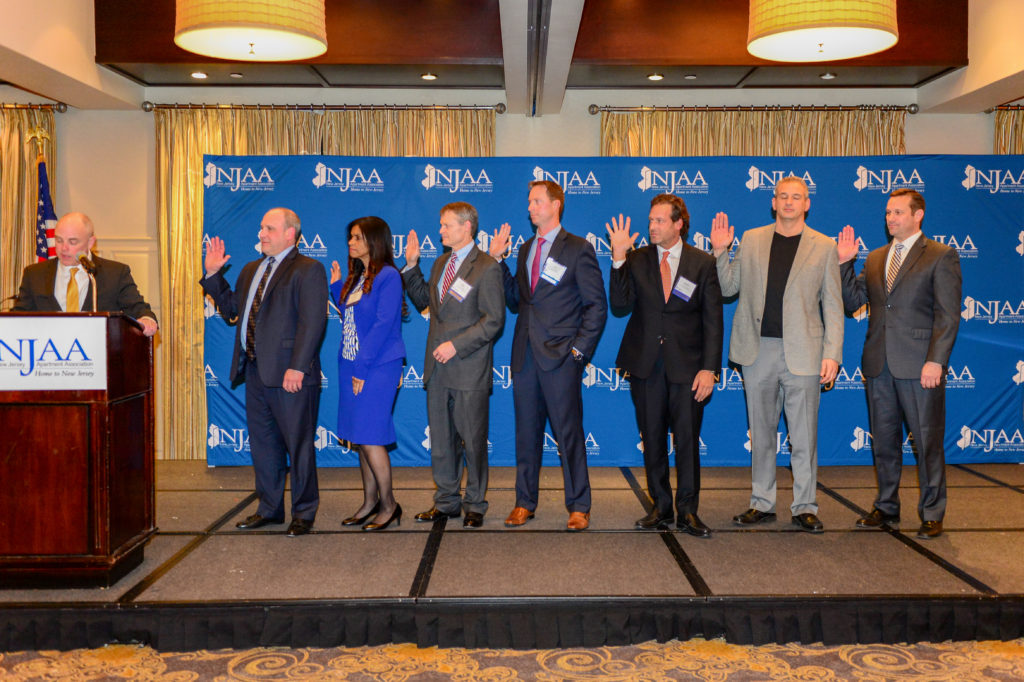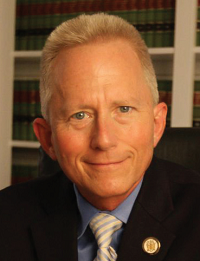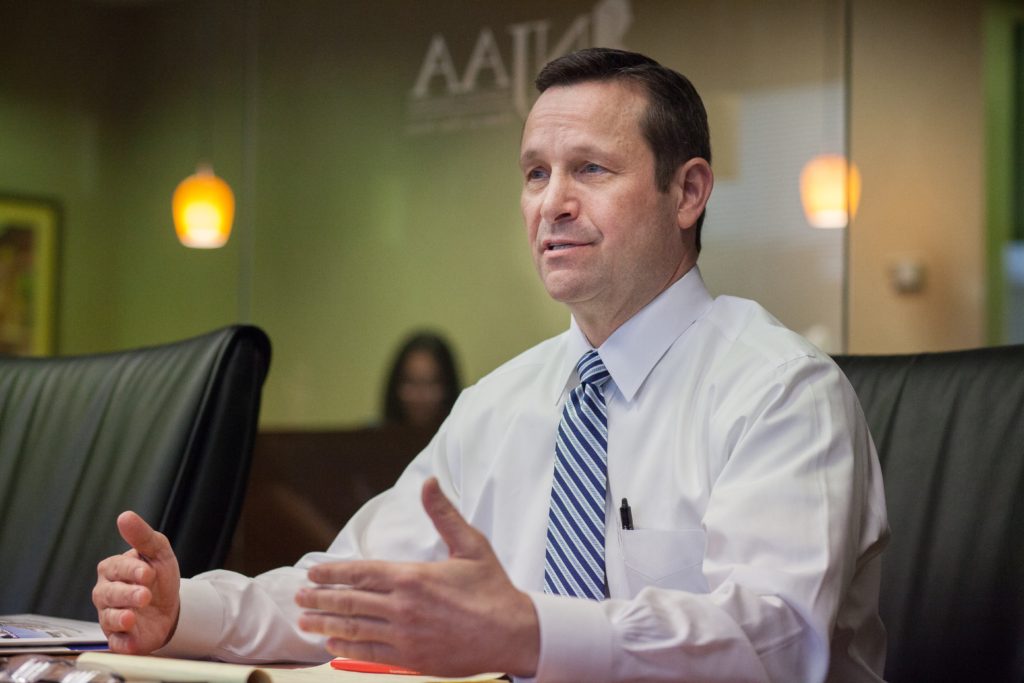David Brogan, executive director of the New Jersey Apartment Association, joined the organization in late 2014 after nearly 20 years in government affairs. He leads a staff of nine at the NJAA’s headquarters in Monroe. — Photo by Mary Iuvone for Real Estate NJ
By Joshua Burd
With an expected crowd of more than 1,600, the reach of the New Jersey Apartment Association will be on full display in late May at its annual spring conference and expo in Atlantic City.
It will be a far cry from the organization’s modest headquarters in Monroe and its nine full-time staff members. But on a recent weekday morning, they were joined by more than 30 members who were on hand for a course in property management, one of dozens of classes that the NJAA offers throughout the year.
“This goes toward professionalizing the industry,” said David Brogan, the association’s executive director. “What we always want to do is make the distinction between the recalcitrant landlords that are out there versus NJAA members, because recalcitrant landlords don’t spend money on education. They’re not going to professionalize themselves.”
Brogan and his team have pushed to expand those offerings while boosting participation over the past three years. Enrollment among members has doubled to more than 1,000, they said, while the NJAA has pushed to market the programs and offer more classes throughout the state.
Yet it’s just one piece of the growth that the NJAA has experienced since late 2014, when Brogan took the reins and moved to expand the organization, create new benefits to members and raise its profile and influence among policymakers and fellow business leaders.
The association has made great strides on all counts. Over the past three years, Brogan and his team have increased NJAA’s owner membership by nearly 13 percent, to 205,000 units from 182,000 units. What’s more, non-dues revenue has increased during that time by more than 20 percent as a result of training, events, sponsorships and other sources.
Those strides have garnered national attention for both the organization and its leader. Last summer, Brogan was named Association Executive of the Year by the National Apartment Association, having been selected from nearly 200 local affiliates.
The NJAA also earned the Excellence Award for Government Affairs for its advocacy on behalf of the multifamily rental industry. It was another source of pride for Brogan, who had spent nearly 20 years in Trenton as both a legislative staffer and a lobbyist.
“(That) told me they recognized what we were doing and that it wasn’t just lip service — it was actual recognition,” Brogan said. “On the government affairs side, I think it demonstrates that we take a sophisticated approach to government affairs at the state and local level, and getting that recognition from the National Apartment Association was something that we’re all very proud of.”
Growing the NJAA is all the more important as it grapples with issues such as rent control and fire safety. It’s also a prominent stakeholder in the effort to find a solution to New Jersey’s housing affordability crisis, which has eluded policymakers for more than a decade.
Brogan noted that the NJAA is in favor of “a broad-based plan” that includes affordable housing production, preservation and rehabilitation. As those discussions continue in a new legislative term, the association will benefit from a view held by many lawmakers: The NJAA brings a rational approach to the policymaking arena.

In fact, according to Assembly Majority Leader Lou Greenwald, Brogan acknowledges that “there are always two sides to every story,” which allows lawmakers to “(bring) more minds, more ideas and more solutions to the table to solve a singular problem.” “So having an honest dialogue and an open dialogue makes us do our job better, and David is someone who has understood that,” said Greenwald, a Democrat based in Voorhees. “I think his background being on staff and serving legislators — and understanding that that is what we look for if we’re doing our job right — has helped him really carry that into his private practice and what he does on the private-sector industry side.”
Brogan feels he was fortunate to begin his government affairs career in the Legislature, which started in 1997 with a job in the Senate Republican office. Over six years, he worked on key committees and on bills tied to high-profile issues such as brownfields redevelopment, open space preservation and transportation funding.
“I was lucky to establish and cultivate relationships there and understand the process,” Brogan said. “I think anyone who starts in the Legislature understands the process a little bit better than someone who doesn’t. So for me, personally understanding and being in the policymaking arena for the first six years of my career was very helpful and laid the foundation for going to that next level.” He then spent two years at Capital Public Affairs, a lobbying firm, where he says he learned how to manage clients and use his relationships in Trenton to help them achieve their goals. He moved to the New Jersey Business and Industry Association in 2005, allowing him to learn yet another side of government affairs, recognizing the need to “balance the needs of the association as a whole and make decisions.”
That meant working with the NJBIA staff on a day-to-day basis to make an impact on issues such as corporate and individual taxation, economic development and job creation programs. Brogan also served during that time as executive director of the New Jersey Organization for a Better State, or NEW JOBS, which was one of the largest business political action committees in the state.
By 2014, he had amassed nearly 20 years of political and government affairs experience that would pave the way for his current position.

Brogan said his introduction to the NJAA came nearly 15 years ago, when the association was his client at Capital Public Affairs. He had not considered the executive director position when it became vacant in 2014, but discussions with the organization’s leaders quickly piqued his interest.
For one thing, he recognized what had become “a very interesting industry” that was in a significant growth period — along with an organization that was wellestablished and on sound financial footing. But it also would allow him to leverage his background in government affairs, while gaining new experience in an executive leadership role.
As he has come to find out, it’s a combination that’s not all that common.
“We see it here in New Jersey, but I’m telling you when you go crosscountry, you don’t see it, (where) you have executive directors who are actively engaged in government affairs advocacy,” he said. “Across the country, at least with the association executives that I’ve talked to, it’s very rare. So it gave me an opportunity to grow and expand and get into an industry that was also growing and was dynamic.”
As Brogan discussed the position with the board at the time, they agreed on a vision for growing the association based on several key areas: the image of the organization, government affairs, education, events and revenue, membership and its political action committee.
“The way I saw it, everything feeds into another core aspect of the vision,” Brogan recalled. When it came to the NJAA’s image, he said it was important for members, the public and policymakers to have a positive view of the association. That has included a rebranding effort, which involved changes even as simple as redesigning the folders that contain handouts for members and the public: What was previously a plain blue cover with only the NJAA logo is now a group of images and buzzwords that highlight its core missions: membership, advocacy, education and networking.
Focusing on membership has meant both growing the overall headcount but also trying to become more responsive, he said. That means meeting the needs of both owner members — which include owners, managers and developers — who typically want government affairs advocacy and education for their staffs — while also providing the networking opportunities that are most important to vendor members.
The results are tough to ignore. Overall revenues have increased by nearly 20 percent and the number of member units continues to grow, thanks to the strength of the multifamily industry, but also the addition of several major operators since 2015.
What’s more, the NJAA marked record attendance by legislators last fall at an annual reception for its political action committee, which drew three dozen state lawmakers and 155 members.
“I honestly believe that success begets success,” Brogan said. “When you demonstrate that you have an association that provides what you are looking for — whether that is advocacy to protect your business, education to professionalize your staff or networking events to grow your business — more people want to participate and existing members want to participate at a higher level than in the past.”

He was quick to point out that “there is no way we could have reached these levels” without the team that he has assembled since 2014. That group is led by Nichole LoPresti, who joined the organization in 2015 and was promoted to executive vice president earlier this year, allowing her to oversee nearly all staff operations and functions for the NJAA.
“This was truly a team effort, and when you put together the right team, the sky is the limit,” Brogan said. He also noted that he has leaned on a board that includes some of the state’s most prominent developers, owners and service providers. That has included William Dailey of President Real Estate LLC, who was the board president at the time of his hiring, followed by Lynne Aber of LPZ Bertram and now Steve Waters of Morgan Properties.
The association has no shortage of legislative and regulatory concerns, especially in a high-cost state like New Jersey. It has scored victories in recent years such as a reduction in the testing requirements for boilers — from every two hours to twice a day — in an issue that the NJAA has been pushing for years but got across the finish line in December 2015.
It’s a low-profile example of what is a recurring theme for the association: working with lawmakers and regulators to find solutions that are fair and sensible, but won’t add unnecessary costs to landlords and managers.

The NJAA has managed to carry that message to many lawmakers and regulatory officials. State Sen. Jeff Van Drew said Brogan is effective at “making it real” when it comes to how proposals for new taxes or fees for multifamily dwellings could ultimately impact renters and buyers. And the conversation often hits home in a state that is already struggling with growing unaffordability and outmigration, he said.
It’s why Van Drew and other policymakers see Brogan as a rational and transparent advocate who is also a resource, rather than a lobbyist who simply voices his opposition at committee hearings. At the same time, he is equally persistent.
“He’s just relentless when it comes to fighting for his people and takes his responsibility so seriously,” said Van Drew, a Democrat based in Cape May Court House, who chairs the Senate’s community and urban affairs committee.
“And yet at the same time, over the years, he’s always had that unique ability to compromise, to work with you so that he is an individual with whom you invest. Because if you have a question about multiple family units … or about rental issues, tax issues, fee issues or any issue, you’ll tend to go to him knowing that you’ll get a really objective viewpoint as well, which is also unusual. He’s just good at his job.”
The NJAA has also grappled with the aftermath of large apartment building fires in northern New Jersey in recent years, which have stoked debate on the need for new, enhanced fire suppression requirements. To that end, Brogan said “residents’ safety is the No. 1 issue for our members — without a doubt.” But he also pointed to a need to “find a solution that makes sense for everybody” when it comes to low- and midrise buildings.
“I think that’s a worthwhile discussion and we definitely want to talk to the Legislature about that,” Brogan said. “However, if you’re talking about building materials and mandating building materials like concrete, then you start looking at other goals of the Legislature, like affordable housing, and if you require those properties to be built out of concrete, that’s at least 30 percent more in cost and those projects simply won’t get done. They won’t pencil out.”

Speaking of housing affordability, Brogan said he feels “we’ve got some opportunities with the Murphy administration,” referring to Gov. Phil Murphy, who took office in mid-January. The NJAA has voiced support for a three-pronged strategy of production, preservation and rehabilitation to help meet a need that advocates say totals more than 150,000 units.
After all, Brogan said inclusionary zoning and 20 percent set-asides can only go so far in providing housing for low- and moderate-income residents.
“I think that’s where we’ve kind of missed the mark,” he said. “People focus solely on the production side, and they don’t think about the fact that you have a large number of multifamily, affordable housing units out there that need to be preserved or rehabilitated. And I’d like to see the state as a whole, from a policy perspective, focus on all three.”
Working with policymakers is a reminder to Brogan that he is constantly learning new things about the apartment sector — even three years after taking over at the NJAA.
“And when you talk about educating the Legislature and working with them on solutions, I think the difficulty lies in how complex this industry is when you’re actually operating an apartment community and with all the different aspects and requirements that you need to face,” he said. “So I’m still learning every day and I’m learning from different facets of the industry.”
Face time
For all of the events and seminars that are held by the state’s commercial real estate sector each year, few are as well-attended as the NJAA’s annual spring conference and expo.
The event has grown each of the last several years and is now expected to draw more than 1,600 attendees to Atlantic City from May 22 to 24. That’s not to mention more than 200 booths from vendors seeking important face time with owners and managers.
“We’re lucky in that the image of the association is continuing to go in the right direction, and our ability to do the marketing that’s necessary to get people there is valuable,” Brogan said. “At that type of conference and expo, you’re going to have your owner members and your vendor members there, and the vendor members are looking for opportunities to sell their products and services in a very short period of time and to make those connections.”
The NJAA has modified the setup in recent years to help facilitate those connections. Instead of an eight-hour, one-day expo at the Atlantic City Convention Center, the association now opens the floor for four hours a day over two days.
“For people who have to present, that’s really helpful,” Brogan said. “It’s not standing around for eight straight hours. … You can be sharp, you can be on your game to sell your product or service. And I think that bodes well for us and that has generated a lot more interest.”










